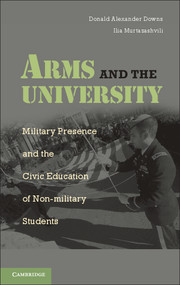Book contents
- Frontmatter
- Contents
- Tables
- Acknowledgments
- Part I A Normative and Pedagogical Framework
- Part II ROTC and the University
- Part III Military History Examined
- 10 Military History
- 11 Half Empty or Half Full?
- 12 Military Presence in Security Studies
- 13 Security Studies in the Wake of the Cold War University
- Part IV Concluding Thoughts
- Index
- References
10 - Military History
An Endangered or Protected Species?
Published online by Cambridge University Press: 05 June 2012
- Frontmatter
- Contents
- Tables
- Acknowledgments
- Part I A Normative and Pedagogical Framework
- Part II ROTC and the University
- Part III Military History Examined
- 10 Military History
- 11 Half Empty or Half Full?
- 12 Military Presence in Security Studies
- 13 Security Studies in the Wake of the Cold War University
- Part IV Concluding Thoughts
- Index
- References
Summary
The moralist must praise heroism and condemn cruelty; but the moralist does not explain events.
– Georges LefebrveHistory would be an impossible area of human reflection if there were no recurrent attributes of human nature.
– Willson H. CoatesUp to this point, our empirical focus has been on the physical presence of the military in universities, which is one of the most charged aspects of campus political life. Yet protests over ROTC are only one dimension of military presence, even if they involve the best-known conflicts. A second dimension of conflict over military presence is more intellectual, one in which the primary conflicts occur within the walls of departments and with various sorties coming from different departments. As we argued in Chapter 2, intellectual consideration of war is perhaps as important as physical presence in bridging the divide between civilian and military life. Intellectual inquiry into war benefits not only students but the student-soldiers on campus. In the following chapters, we consider empirically the status of military history and political realism in the academy. In particular, we are interested in the degree to which the disciplines of history, political science, and security studies facilitate an appropriate military presence, as well as broad trends in the status of the study of war in its more traditional forms within these disciplines.
This chapter and the next one focus almost exclusively on military history within its traditional abode, history departments. Our central objective of this chapter is to present a conceptual framework that informs our analysis of military history, as well as the first of the results from our surveys. Although we emphasize the status of military history in its conventional abode, we do not limit our consideration of military history to history departments, for we are also interested in military history’s status in political science and security studies programs. Indeed, our theory of productive friction, which highlights diverse perspectives, suggests the importance of military history for those who are primarily interested in the study of politics and security.
- Type
- Chapter
- Information
- Arms and the UniversityMilitary Presence and the Civic Education of Non-Military Students, pp. 283 - 319Publisher: Cambridge University PressPrint publication year: 2012



